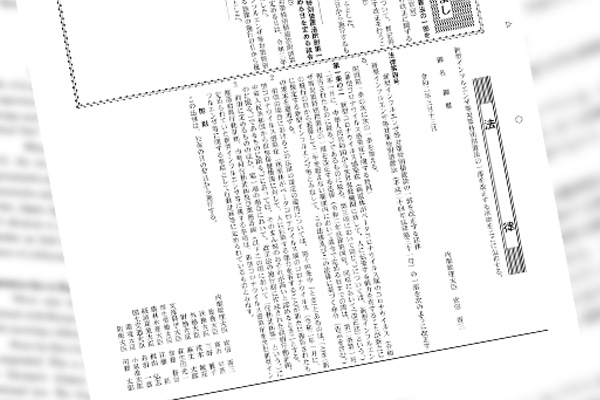People who oppose a proposal for inserting an emergency clause into the constitution assert that laws other than the constitution can respond to any emergency. Is this assertion true? Let’s consider why an emergency clause is required in the constitution rather than any other laws.
What to do when Diet cannot be convened?
First, exceptions to a quorum for the legislature and an emergency cabinet ordinance system should be provided in the constitution in preparation for cases where the National Diet legislature cannot be convened to enact any law.
Those calling for non-constitution laws to respond to emergencies should consider what to do when the Diet or even an emergency session of the House of Councillors cannot be convened due to an outbreak of a stronger infectious disease than the now-expanding novel coronavirus disease.
The quorum for the House of Representatives or Councillors is set at one-third of all members of respective houses in the constitution and cannot be changed by any other law.
An emergency ordinance system should be adopted to allow the cabinet to issue emergency orders on behalf of the Diet when the legislature cannot be convened. Such orders may be approved by the Diet after the crisis is over. Such emergency ordinance system has been adopted in some countries including Austria, Spain and Italy.
Second, special exceptions to the term of lawmakers have no choice but to be provided in the constitution. What could be done when an infectious disease epidemic makes it impossible to implement a general election of the lower house after the chamber’s dissolution or an upper house election just before the expiration of the six-year term for its members?
Third, an emergency clause should be put into the constitution in preparation for a case where such clause in any other law is suspected as unconstitutional and fails to work.
For example, the Act on Special Measures for Pandemic Influenza and New Infectious Diseases Preparedness and Response, revised in response to the coronavirus pandemic, allows authorities to use land lots without consent by their owners (Paragraph 2 of Article 49) and to expropriate some essential goods (Paragraph 2 of Article 55) and could be asserted as running counter to Paragraph 1 of the constitution’s Article 29 (inviolability of the property right). There would be no time for a court fight if a lawsuit is filed against government actions during an emergency. If an emergency clause is in the constitution, such confusion may be avoided.
When the Act on Special Measures is revised again to allow a curfew to be imposed in response to a stronger infectious disease than the current coronavirus disease, a constitutional provision for temporary restrictions on the freedom of movement, as seen in Article 11 of the German constitution, would be useful for avoiding any problem with the constitution.
There would thus be quite a few problems that could be resolved by constitutional amendments.
Full dependence on non-constitution laws hurting the constitution
To authorize the exceptional use of state power and to restrict human and private rights during emergency by enacting laws without constitutional basis would amount to trampling the constitution. In fact, those against inserting an emergency clause into the constitution are trying to expand the use of state power with non-constitution laws in defiance of the constitution while describing the constitution as designed to prevent state power from running out of control. Are they failing to find the contradiction? Their position amounts to denying the constitutionalism.
Full dependence on non-constitution laws might repeat a wartime national general mobilization act regime that has been criticized by opponents to the emergency clause in the constitution.
Akira Momochi is a director of the Japan Institute for National Fundamentals and a special professor at Kokushikan University.


